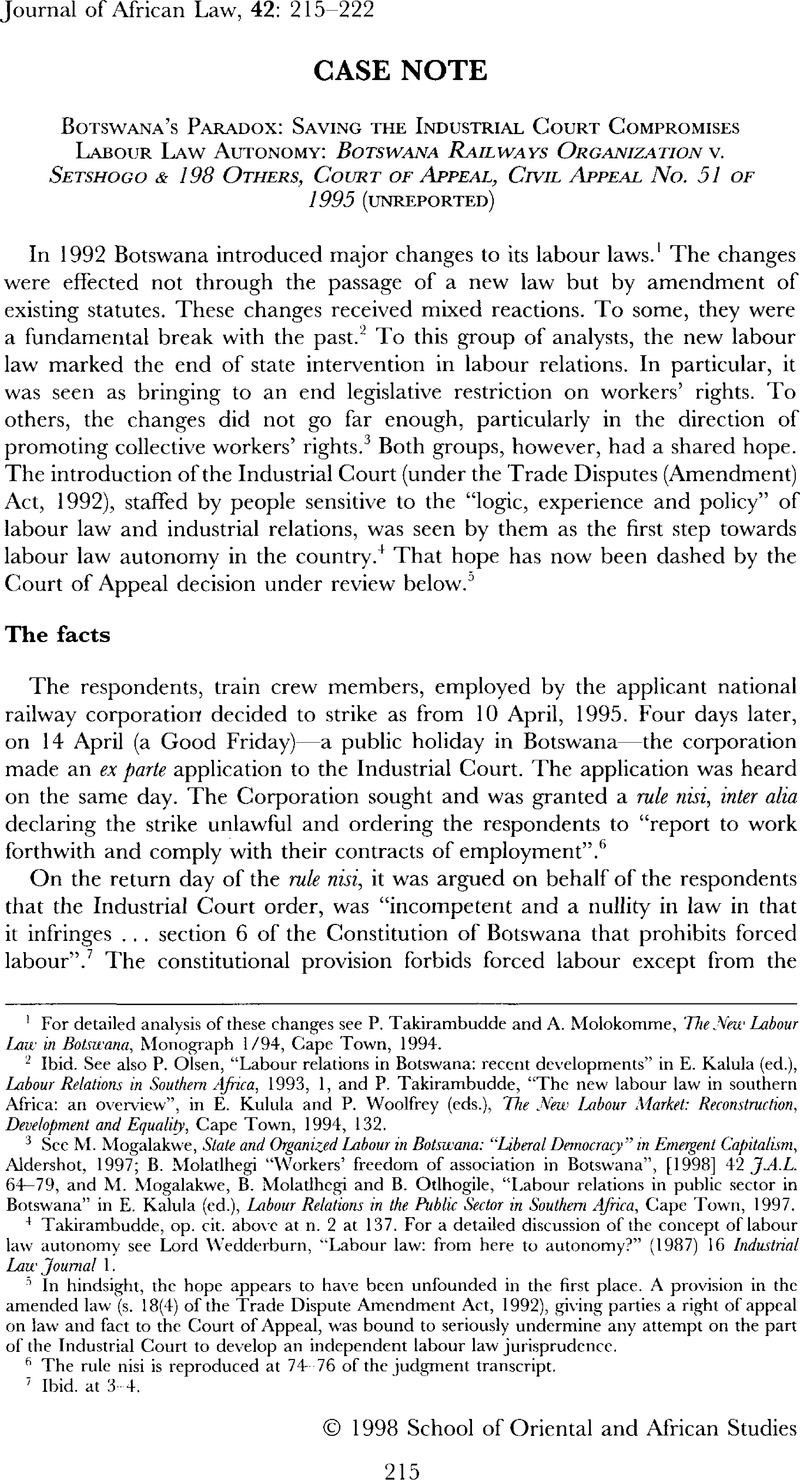Published online by Cambridge University Press: 28 July 2009

1 For detailed analysis of these changes see Takirambudde, P. and Molokomme, A., The New Labour Law in Botswana, Monograph 1/94, Cape Town, 1994.Google Scholar
2 ibid. See also Olsen, P., “Labour relations in Botswana: recent developments” in Kalula, E.(ed.), Labour Relations in Southern Africa, 1993, 1,Google Scholar and Takirambudde, P., “The new labour law in southern Africa: an overview”, in Kulula, E. and Woolfrey, P. (eds.), The New Lbour Market: Reconstruction, Development and Equality, Cape Town, 1994, 132.Google Scholar
3 See Mogalakwe, M., State and Organized Labour in Botswana: “Liberal Democracy” in Emergent Capitalism, Aldershot, 1997;Google ScholarMolatlhegi, B. “Workers' freedom of association in Botswana”, [1998] 42 J.A.L. 64–79,CrossRefGoogle Scholar and Mogalakwe, M., Molatlhegi, B. and Otlhogile, B., “Labour relations in public sector in Botswana” in Kalula, E.(ed.), Labour Relations in the Public Sector in Southern Africa, Cape Town, 1997.Google Scholar
4 Takirambudde, op. cit. above at n. 2 at 137. For a detailed discussion of the concept of labour law autonomy see Lord, Wedderburn, “Labour law: from here to autonomy?” (1987) 16 Industrial Law Journal 1.Google Scholar
5 In hindsight, the hope appears to have been unfounded in the first place. A provision in the amended law (s. 18(4) of the Trade Dispute Amendment Act, 1992), giving parties a right of appeal on law and fact to the Court of Appeal, was bound to seriously undermine any attempt on the part of the Industrial Court to develop an independent labour law jurisprudence.
6 The rule nisi is reproduced at 74–76 of the judgment transcript.
7 Ibid. at 3–4.
8 Botswana Constitution, s. 6(3) (a).
9 See s. 18(3) of the Botswana Constitution which provides: “If in any proceedings in any subordinate court any question arise as to the contravention of any of the provisions of sections 3 to 16 (inclusive) of this Constitution, the person preceding in that Court may, and shall if any party to the proceedings so requests, refer the question to the High Court unless, in his opinion, the raising of the question is merely frivolous or vexatious.” (Ss. 3 to 16 deal with the Fundamental Rights and Freedoms of the Individual. These include the prohibition of forced labour, s. 6(2).)
10 At 32 of the judgment transcript.
11 Ibid. at 42–43.
12 The High Court in Botswana is given original jurisdiction by s. 95(1) of the Constitution which provides that: “There shall be for Botswana a High Court of which shall have unlimited original jurisdiction to hear and determine any civil or criminal proceedings under any law and such other jurisdiction and powers as may be conferred on it by this Constitution or any other law.”
13 Aguda, J.A., dissented on procedural grounds. He therefore did not address the substantive issues.Google Scholar
14 At 32–33 of the judgment transcript.
15 Ibid. at 39. [Emphasis added.]
16 See the case of Botswana Bank Employees Union and Another v. Barclays Bank of Botswana Limited, Civil Appeal No. 1 of 1995 (unreported).
17 See s. 24(1) of the Interpretation Act [Cap. 01, 04].
18 At 41 of judgment transcript.
19 Ibid. at 49.
20 Ibid. at 60.
21 Ibid. at 59–60.
22 Ibid. at 66.
23 Beatty, D., “Labour law in a nutshell: the influence of a national casebook”, (1996) 75 The Canadian Bar Review, 35 at 41.Google Scholar
24 S. 17(1).
25 At 99 of the judgment transcript.
26 Ibid. at 99–100.
27 Ibid. at 58.
28 For detailed discussion see Lord, Wedderburn“The injunction and the sovereignty of parliament”, (1989) 23 Law Teacher 4,Google Scholar and Catherine, O'Reagan, “Contempt of court and the enforcement of labour injunction” (1991) 54 Modem Law Review 385.Google Scholar
29 See, for example, Botswana Bank Employees Union and Another v. Barclays Bank of Botswana Limited, above, at 16.
30 At 60 of the judgment transcript.
31 Takirambudde, op. cit. above at n. 2, at 137.